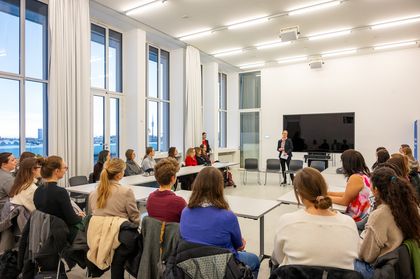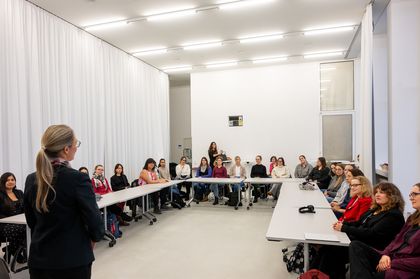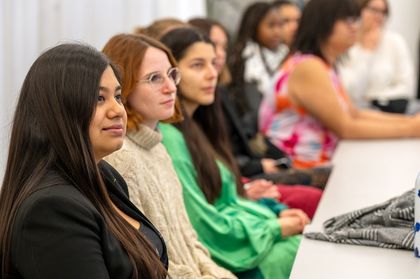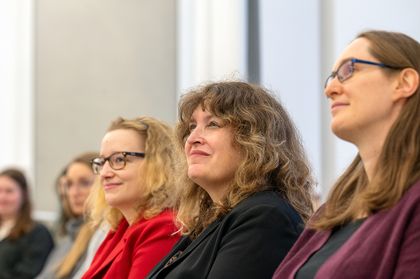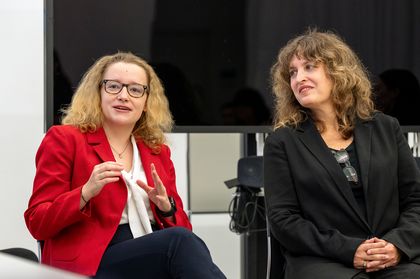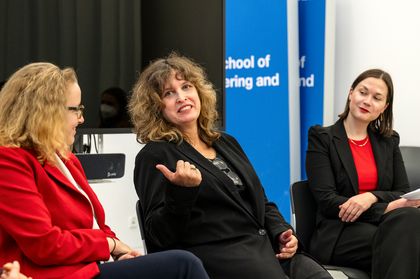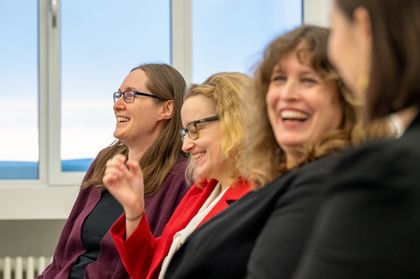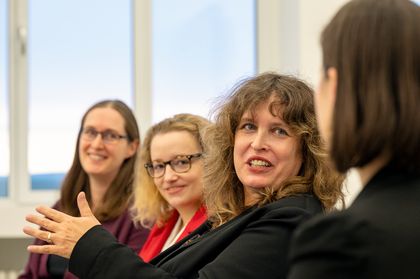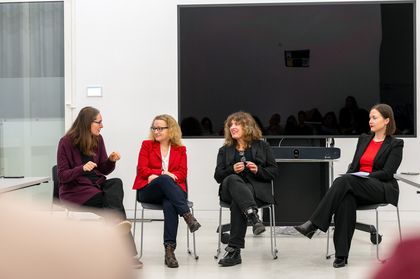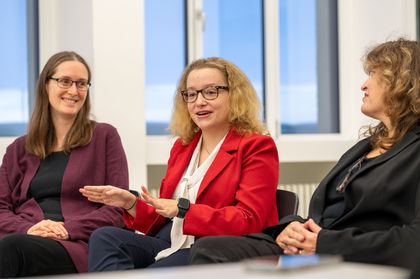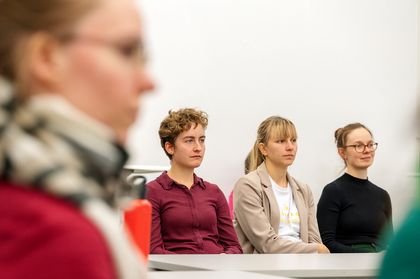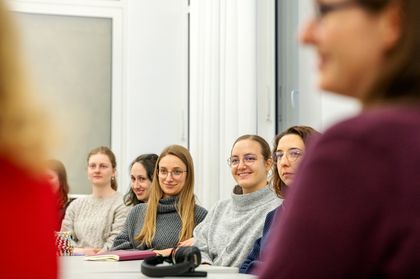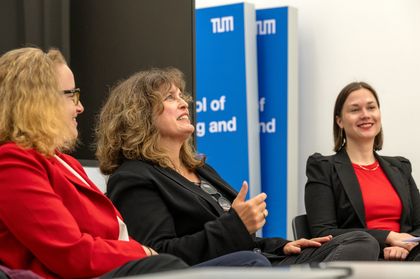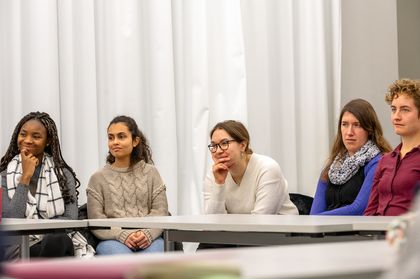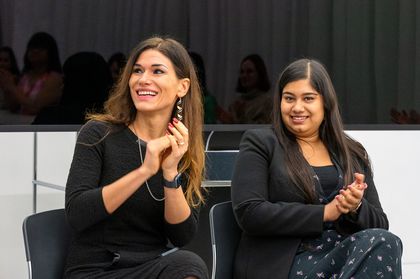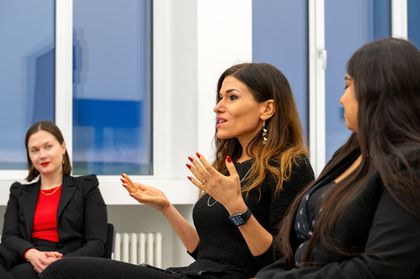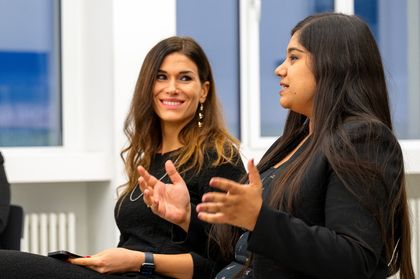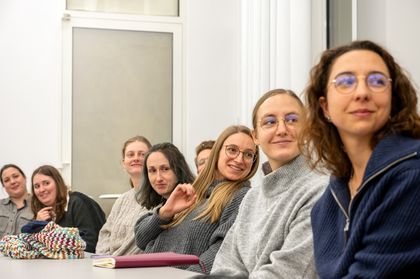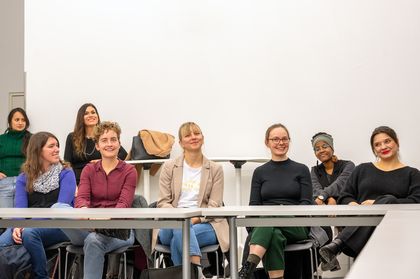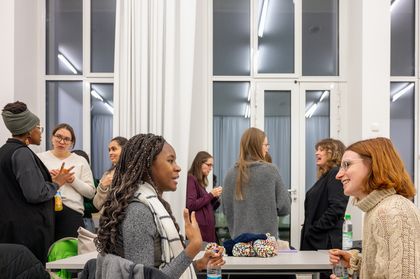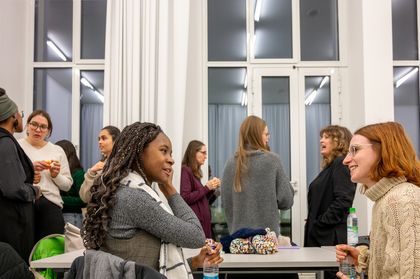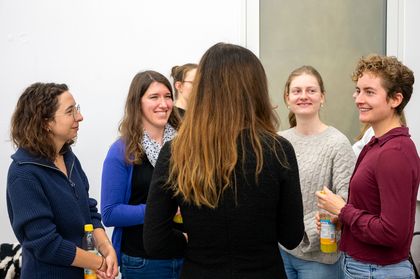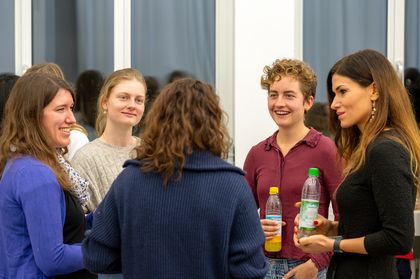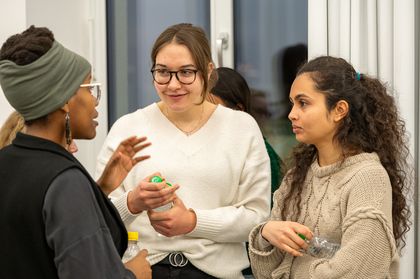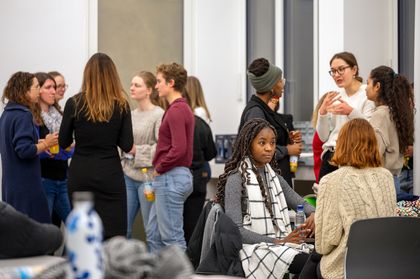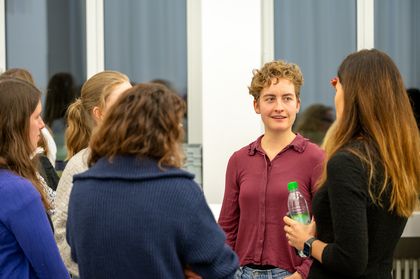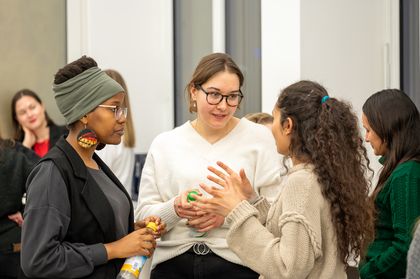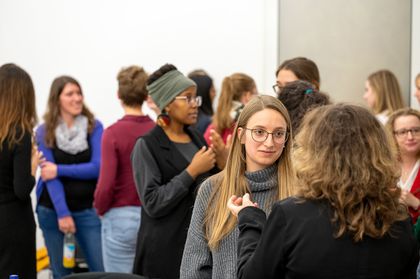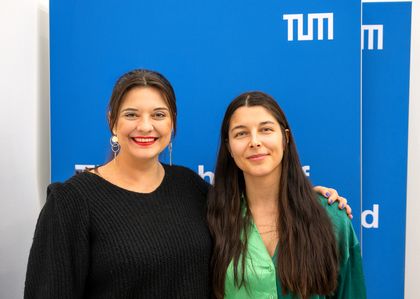Support program for women with a non-academic background
*** We are the winner of the Impact of Diversity Awards in the “University” category and are delighted ***
With the Agnes-Mackensen-Program, we strengthen the self-efficacy of first-generation academics and promote their digital, scientific and entrepreneurial leadership skills. In doing so, we are intertwining the diversity dimensions of gender and social origin and are thereby raising TUM-wide awareness.
Are you a first-generation academic and do have questions about our program or would you like advice on which content might suit you best? Are you interested in the mentoring offer, but are still unsure? Then get in touch with us via stabsstelle@chancengleichheit.tum.de
The program is named after the first woman to study at TUM, who obtained a diploma in 1915 and is therefore considered the first graduate (and beyond that did not have an academic family background!). It is initiated by the Staff Unit Diversity & Equal Opportunities of Senior Vice President for Talent Management & Diversity Prof. Dr. Claudia Peus who is also the patroness for the program. She calls on young people in the target groups to apply for the program: "We cannot simply accept the fact that so many talented individuals are currently still not able to unleash their full individual potential. The social divide in the German educational system is unfortunately very large, and both those affected and we as a society suffer greatly because of it. We at TUM are therefore taking up the task and working to tangibly improve the situation."
Impressions from our mentoring kick-off event

"I felt like I didn’t belong in an academic environment. I think I would have felt more at ease and more self-assured if I had someone who said: you belong here, you are going to be fine!"
Ambassador
Prof. Donna Ankerst Ph.D.
Vice Dean Talent Management & Diversity, Professorship in Biostatistics, TUM School of Computation, Information and Technology
Background information
The German education system is characterized by a high level of social selectivity – yet, we need talent in all its diversity. Children from non-academic backgrounds, i.e. without a parent with an academic degree, have lower participation rates and higher dropout rates at all levels.
At the same time, women are still a minority in STEM (sciences, technology, engineering & mathemathics subjects) and also with increasing hierarchies of academic levels. This also has an impact on their share in leadership positions and in building start-ups.
Aim of the program
The Agnes-Mackensen-Program aims to counteract the lack of equal opportunities for women* with a non-academic background and to increase their proportion among graduates in order to lay the foundation for later work as a start-up founder, scientist or leader of the future and thus strengthen innovation in science, business and society.
Details of the program
Program start: winter semester 2023/2024
The program is built upon two areas: mentoring & networking and workshops:
- Mentorship
Our mentoring is understood as an offer of individual advice and trustworthy support. Your mentor can help you gain self-confidence and make future-oriented decisions. Through the exchange with mentors, mentees not only receive practical knowledge, but also inspiration and encouragement to achieve their goals. Mentoring provides a sense of belonging and creates a platform for knowledge sharing, ultimately contributing to personal growth, improved performance and a stronger sense of community.
- Networking
Regular networking get-together will be organized, each of which is accompanied by varying keynotes by different experts from the areas of diversity, LGBTQIA+ and first generation, among others. We start with the kick-off event on December 5, 2023 at 4pm in the Vorhoelzer Forum on TUM main campus.
- Workshops
The workshops have different focus areas: learning how to code, creative approach to scientific work and everything you need to know about entrepreneurship. You do not need to be part of the mentoring program to take part in the workshops.
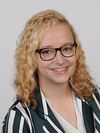
"As a first-generation student, I felt insecure and out of place at the beginning of my studies. A lot of things other people take for granted were new territory for me. Exchanging with other first-generation students together with a shared community are therefore extremely helpful."
Ambassador
Julia Eichinger
Master Student in Health Science – Prevention and Health Promotion, TUM School of Medicine & Health
The target group of the Agnes-Mackensen-Program are FINTA* with a non-academic background and thus addresses women, intersex, non-binary, trans and agender people whose parents have not studied. Mentees can be FINTA* people who are studying or who are academics (PhD candidates / postdocs).
The TUM sees itself as an active place of innovation and progress and is therefore closely linked to educating digital know-how, creative scientific thinking and the development of start-up ideas. At the same time, both women and people with a non-academic background are disadvantaged in terms of learning a coding language, access to scientific education and entrepreneurship. TUM not only imparts theoretical knowledge to students and scientists, but also equips them with self-efficacy, the ability and willingness to facilitate innovation, and with an entrepreneurial spirit.
Mentees get preferential access to the workshops, which are generally open to all FINTA* people at TUM.
CODING CAPABILITIES for bachelor students
FINTA* bachelor students (preferred but not mandatory) in STEM and with non-academic parents learn to program within a series of workshops. The principles of programming and electronic data processing are explained using a simple coding language (Python). The workshops will take place on four evenings in October 2023 at the TUM main campus, followed by a motivational talk on “Why should I care about coding?“, held online. Previous knowledge is not necessary, the attendees need to bring their own laptop.
Dates, 5pm-7pm each:
- 02.10.23
- 04.10.23
- 09.10.23
- 11.10.23
Sign up for the workshop.
Please find the room details here.
The date for the online motivation talk will be November 13, 2023.
SCIENTIFIC CREATIVITY for master students
FINTA* master students (preferred but not mandatory) in STEM and with non-academic parents learn the art of a creative approach to scientific work. Two TUM PhD candidates will show you what it means to work in academia and how a research process works. You will develop valuable skills that will help you to think creatively about academic work – and to decide if you would enjoy a career in academia. Upon interest, the workshops will take place on five evenings in November and December of 2023 on the TUM main campus or in Garching. The attendees need to bring their own laptop.
Dates, 5pm-7pm each:
- 02.11.23
- 09.11.23
- 16.11.23
- 23.11.23
- 30.11.23
Sign up for the workshop.
Please find the room details here.
ENTREPRENEURIAL THINKING for PhD students and postdocs
In the "Entrepreneurial Thinking" workshop, FINTA* doctoral candidates and postdocs (preferably but not mandatory) with non-academic parents get to know opportunities, innovation impulses and motivations related to entrepreneurship. Find out who at TUM is supporting you in the field of start-ups, how a start-up process works and get to know female founders and investors alike. In addition, experts share how a professional career in the field of entrepreneurship can be designed and to what extent leadership plays a role. The workshops will take place on the main TUM campus on 6 evenings in the winter semester 2023/2024; Previous knowledge is not necessary.
5pm-7pm each:
1) Entrepreneurship @ TUM: Who can answer my questions on entrepreneurship and how do I even start?
- Expert: Juliana Bonitz (TUM)
- Oktober 5, 2023
2) Founding process: How does founding work and what do I need to consider?
- Expert: Belinda Büchner (TUM)
- November 15, 2023
3) From the life of a founder: What does everyday look like as a founder and what do you wish you had known before becoming an entrepreneur?
- Expert: Dr. Christina Glantschnig (Founder of 2NA FISH)
- December 12, 2023
4) Don’t be funny with my money: What are investors interested in and how can I best convince them of my idea?
- Expert: Amanda Birkenholz (UVC Partners)
- January 10, 2024
5) Career advice: How do I combine my current academic / professional life with the purpose of founding?
- Experts: Jennifer Rupp (TUM) and Claudia Doblinger (TUM)
- February 7, 2024
6) Leadership: How do I lead a team and not get lost in my entrepreneurial occupation?
- Experts: Nicola Breugst (TUM) and Tina Ruseva (Founder Mentessa and Big & Growing New Work Festival)
- March 13, 2024
Sign up for the workshop.
Please find the room details here.
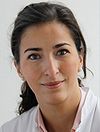
"Going from Hauptschule to Realschule to Gymnasium to university and eventually owning a doctoral degree – this path was rocky, but today I am happy, proud and grateful."
Ambassador
Dr. med. Mine Sargut
Specialist for Visceral Surgery, Clinic and Policlinic for Surgery, Klinikum rechts der Isar
Mentors can be people of all genders (preferred but not mandatory) with a non-academic background across all academic levels (master’s and bachelor’s students in higher semesters, PhD candidates, postdocs, scientists, academics, professors).
We see the mentors as "role models at eye level": On the one hand, they can convey a sense of belonging to the participating first-time academics on an empathetic level; on the other hand, they know at best both the TUM and the German university system and can pass on differentiated information, explain processes and academic specifities in an approachable way.

